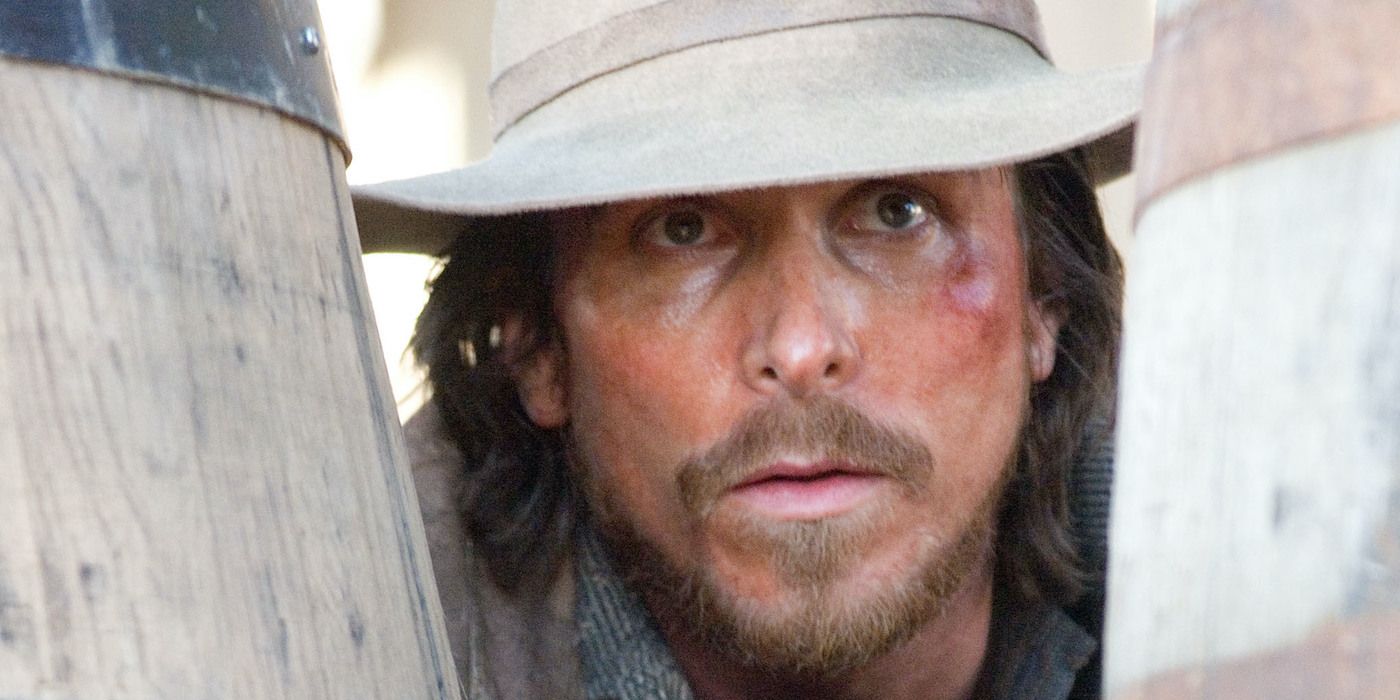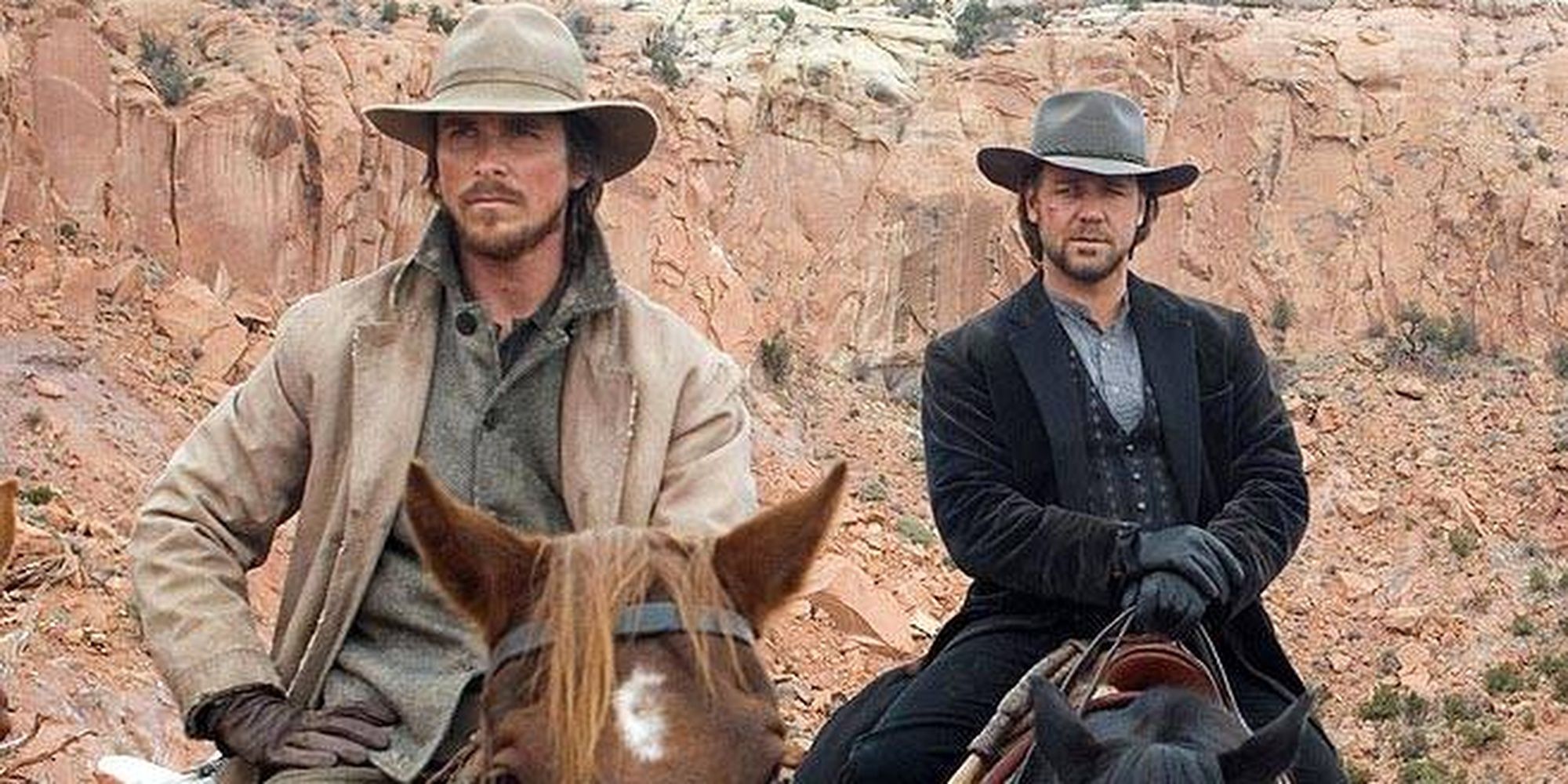The Western genre is one of the oldest in cinematic history; 1903’s The Great Train Robbery kicked off a style of American storytelling that has grown and evolved over the course of a century. Many of these stories are inherently similar, so it's not unusual to see remakes of some of the most iconic classics within the genre. Films like The Magnificent Seven, True Grit, Ned Kelly, and Rio Lobo spawned new adaptations, so the idea of remaking Delmer Daves’ 1957 classic 3:10 to Yuma was not particularly egregious. While some remakes have failed to find a reason to replicate perfection, director James Mangold unlocked the central relationship within the story to make his 2007 film even stronger than the original. That is certainly not a statement that can be made lightly considering how influential Daves’ original film was, but Mangold injected the same emotional complexity, sensitive depiction of masculinity, and heartbreaking realism to 2007’s 3:10 to Yuma that he did in Ford vs. Ferrari, Logan, Walk the Line, and Girl, Interrupted.
The original film centers on a tense bond between the struggling rancher and family man Dan Evans (Van Heflin), a combat veteran who is content on staying at his home and mentoring his young children. However, financial struggles have hit his family hard, and Evans gets word that the ruthless outlaw Ben Wade (Glenn Ford) must be taken to prison by train. Evans gradually decides to accept the job when none of the other men in the community are brave enough to do so, as they know that Wade’s gang will seek to set him free before the 3:10 departs. While Heflin and Fords’ verbal sparring is entertaining, the remake gives both characters more depth and identifies the radically different morality that they both live by. While it’s just as tense and exciting, Mangold inserts the dynamic between Evans (Christian Bale) and Wade (Russell Crowe) in the 2007 film that feels like the two have reached some sort of understanding. It transforms an enjoyable standalone chase movie into a larger commentary on Western movie archetypes and what defines gunslingers and outlaws.
Christian Bale and Russell Crowe Have Great Chemistry in '3:10 to Yuma'
The Western genre has always relied upon star power, particularly in its Golden Age between the new revival with John Ford’s 1939 sensation Stagecoach and the introduction of the “spaghetti” style in 1964’s A Fistful of Dollars. Not every Western that John Wayne, James Stewart, Yul Brennan, or even Glenn Ford himself was necessarily equal in terms of quality, but their simple charisma and line delivery never wavered; audiences could expect that Gary Cooper was just going to do something cool, even if it’s not a classic like High Noon. In the case of 3:10 to Yuma, Heflin, and Ford are both chewing the scenery in an enjoyable way; Heflin gets to lean backward in moral outrage, and Ford gets to spew vile insults and highlight his cruelty during their journey together. It’s more grounded so that they’re not caricatures, but both actors are more or less sticking close to familiar personas. Comparatively, Bale and Crowe insert a moral nuance that shows how Evans and Wade might not be as different as they think they are.
If Heflin’s version of Evans is skeptical about taking in Wade for the sympathetic, but rather simplistic reason that he wants to protect his family from danger, then Bale inserts a deeper sense of regret and mourning. Evans’ daily routine is a grueling one, and he’s not given any more respect in his community due to his status as a decorated veteran with injuries from war; there’s a startling moment early on when he’s confronted about his debts by the terrifying ranch hand Tucker (Kevin Durand), who works for the local collector. Evans knows that taking the job is critical for his family’s future, but is also tired of violence, warfare, and hatred. He’s done his best to purge these memories, and Wade is just a reminder of the types of depravity he saw in the Civil War. Mangold’s version also gives more insight into his sons, with Logan Lerman giving a terrific youthful performance as William, the older of the two who dreams of traveling and heroism, only to be rebuffed by his father’s safety concerns.
Crowe is more of a cold, calculating villain than Ford; he has a directness in his tonality that is scarier than any over-the-top speech could be. His simple line to his men at the beginning that they will just tie up and ransom Wade if he becomes a threat is chilling, as he continues to show an active disregard for living things. Crowe is aided by an incredible performance by Ben Foster as his second-in-command, Charlie Prince, another character that isn’t as critical in the original. Prince operates like a machine and the rest of the gang is unflinchingly loyal, so as a result Wade’s conversations with Evans feel like he’s looking for truth when he’s been treated to nothing but admiration.
James Mangold Creates an Epic Conclusion in His '3:10 to Yuma'
Neither man has any grand assumptions that they’ll change the other’s mind, but a healthy acknowledgment emerges; Wade can respect that Evans is acting out of honor and for the sake of his children, and Evans knows that whatever consequences Wade will face legally will hardly prevent him with a total of all his crimes. Interestingly, it's Wade who is attempting to be reasonable amidst the final shootout; he tries to take advantage and strangle Evans as his men arrive not to kill him, but to take him out of commission before the violence unfolds, as he knows Prince will have no sympathy. Evans’ children have escaped, but his allies grow thin, and Wade understands that he’s now acting out of personal honor. He’s committed in a way that earns Wade’s begrudging respect; he ends up agreeing to an arrest, as he’s already escaped from Yuma Prison before, and would now only be temporarily sidelined so that Evans’ sons can see their father as a hero.
While Wade saving Evans in the original is more of a cool moment that makes the conclusion more memorable, it’s a fully developed choice in the remake. Not only does Wade help Evans avoid gunfire, but he eventually turns on his own men and strikes them down one by one in cold blood. It’s a shocking moment where it’s clear Wade could have escaped at any point in the entire film, in what is a deeply moving statement on Mangold’s part. As he’s shown throughout the film, victory is temporary, but honor is what makes someone a legend.


